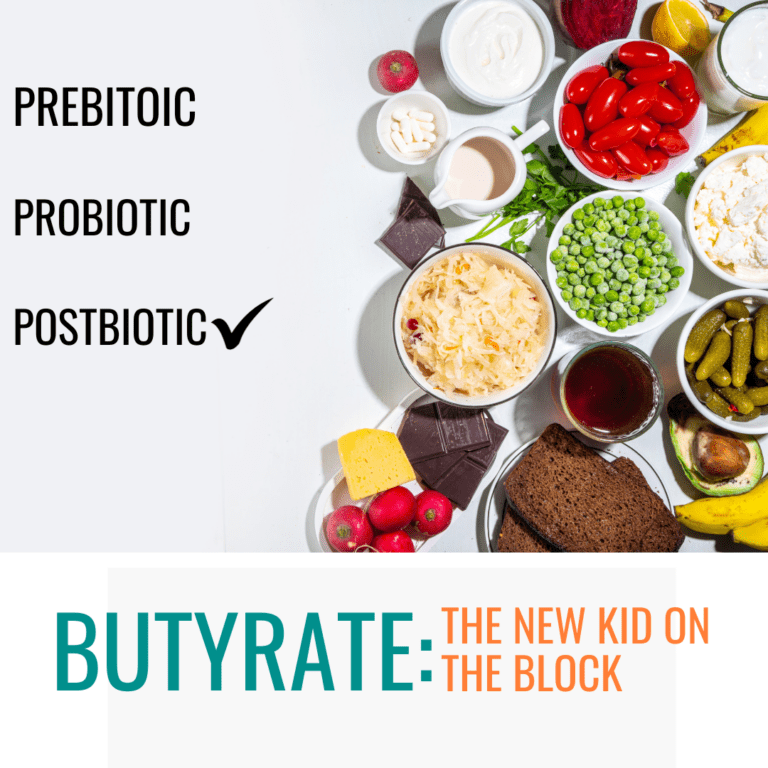Most people have heard of probiotics, or the good bacteria in our gut, and prebiotics, the food for the probiotics or good gut bacteria, but have you heard about postbiotics?
🍌(prebitoic) ➡️🦠(probiotic) ➡️🤩(postbiotic)
What Are Postbiotics?
🔍Postbiotics are the natural byproducts of our gut bugs’ fermentation process when they feast on dietary fiber. We eat the fiber/prebiotics, our gut bugs help us break down that fiber, and then they produce these postbiotics.
Here are examples of some common post-biotics:
- ✅Butyrate: A short-chain fatty acid produced by the fermentation of dietary fiber in the colon. It’s known for its gut-healing and anti-inflammatory properties.
- ✅Propionate: Another short-chain fatty acid produced during the fermentation of fiber. It plays a role in regulating metabolism and appetite.
- ✅Acetate: The third major short-chain fatty acid produced in the colon. It has various metabolic effects and can contribute to overall gut health.
- ✅GABA (Gamma-Aminobutyric Acid): An inhibitory neurotransmitter that can be produced by certain gut bacteria. It may have potential effects on mood and anxiety.
- ✅Bacteriocins: Antimicrobial peptides produced by certain bacteria to inhibit the growth of harmful pathogens in the gut.
Why Postbiotics Matter:
💞Gut Harmony: Postbiotics help maintain a harmonious gut environment, keeping your digestion on track and reducing unpleasant symptoms like bloating, diarrhea, or constipation.
💪Immune Boosting: They give your immune system a boost by promoting a balanced gut flora. With ~70% of our immune system located in our gut, a healthier gut means a stronger immune system.
🔥Inflammation Buster: Postbiotics, especially Butyrate, are known for their anti-inflammatory properties. They help calm down the inflammation in our GI tract that leads to things like: bowel urgency, diarrhea, cramping, bacterial imbalance, and leaky gut.
The Star of the Show: Butyrate
🔦Now, let’s shine the spotlight on Butyrate. This postbiotic is a true gut hero. Butyrate is a short-chain fatty acid that your gut bugs produce when they munch on fiber. Here’s why it’s a game-changer:
A Deep Dive into the World of Butyrate:
- 🍴Production Inside You: Butyrate is a short-chain fatty acid naturally produced in the colon by gut bacteria through the fermentation of dietary fiber. It’s a natural byproduct of the digestive process.
- 🧱Gut Wall Support: Butyrate is crucial for maintaining a healthy gut lining. It helps nourish and strengthen the cells lining the colon, contributing to a well-functioning gastrointestinal tract.
- 🔥Anti-Inflammatory: Butyrate is known for its anti-inflammatory properties. It helps reduce inflammation in the gut, which can be beneficial for individuals with conditions like inflammatory bowel disease (IBD) and irritable bowel syndrome (IBS).
- ⚡Energy Source: The cells in the colon use butyrate as a primary energy source. It plays a significant role in providing the necessary energy for these cells to function optimally.
- 💩Promotes Bowel Regularity: Butyrate can help promote regular bowel movements and alleviate symptoms of constipation by supporting healthy gut motility.
- 🦠Balances Gut Microbiota: Butyrate supports a balanced and diverse gut microbiota, which is essential for overall gut health. A diverse microbiome is associated with better digestion and a stronger immune system.
- 🧬Potential Cancer Protection: Some studies suggest that butyrate may have a protective role against colorectal cancer. It can inhibit the growth of cancerous cells in the colon and promote apoptosis (cell death) in these cells.
- 🧠Mood and Brain Health: Emerging research indicates that the gut-brain connection may be influenced by butyrate. It could potentially have an impact on mood and cognitive function by modulating inflammation and the gut-brain axis.
Food Sources of Butyrate:
Butyrate isn’t just a mysterious compound. You can find it in everyday foods. Here are some delicious sources:
- 🧈Ghee: This clarified butter is a Butyrate goldmine. It’s rich, creamy, and adds a delectable flavor to your dishes. BONUS: even if you don’t tolerate lactose in many dairy options, you may still tolerate ghee with it being lactose free. Some great ways to use ghee: cook your eggs in it, smother it onto your favorite sourdough, mix it into your mashed sweet potatoes, or sauté your veggies in it.
- 🧈Butter: Yes, good ol’ butter! Butyrate content varies depending on the source and processing, but grass-fed organic butter is often a great choice!
- 🫐Fiber-Rich Foods: Remember, Butyrate is produced when your gut bugs digest fiber. Load up on fiber-rich foods like whole grains, beans, lentils, and fruits and veggies.
Example of a butyrate boosting breakfast:
🍳Eggs/spinach/tomato scramble cooked in ghee with a side of sprouted oats topped with ground flax/chia + raspberries (dash of cinnamon added to the top)🍓
Postbiotics are a word you will be seeing more and more in the gut health world, with Butyrate leading the way. By feeding your gut bugs the right fiber-rich foods, you’re not only keeping them full and happy, but you are also reaping the incredible health benefits of Butyrate and other postbiotics.🤩
🎙️If you struggle with bloat and feel limited in your food choices, it is possible heal your body AND relationship with food! Did you know I have a secret podcast walking alongside you with some next step tips to do just that. Learn to fix your gut and love food again HERE!🎙️
Remember, the information provided in this blog is for educational purposes only and should not replace medical advice. Consult with a healthcare professional for personalized recommendations.
Note: always consult your healthcare provider before trying anything new. This blog is for informational purposes only and is not medical advice.









